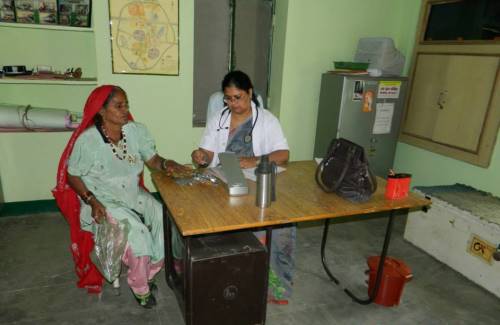
Despite tremendous efforts made by the government to improve the health scenario of the region, economically vulnerable section of the society remains largely excluded from the benefits of all this advancement. It is a well established fact that people from most developing nations which are hard hit regions register shorter life expectancies due to high cost of medical facilities which is out of their paying capacity.
Without adopting a holistic approach of development making differences in lives of rural masses is a pathetic job. In this string SWERA started working in the area of health with the objective of providing primary health care services to rural masses. Initially, the programme concentrated on sanitation and health education issues, but over the years preponderance of our experiences suggested that maternal and child health was still an untouched issue which required more intensive efforts to keep the spiralling IMR and MMR under check. Thus this issue was included and placed at upper most priority stratum of organisation’s health programme. As of today, this programme is reaching out to the target village communities through a health centre erected with handholding support of Population Foundation of India and through a network of Village Health Committees. This committee comprises of Village Health Workers, Traditional Birth Attendants and a few members of Women Health Group.
The programme has been quite successful in creating awareness about hygiene and health issues, but there is a need to focus on the problem of malnourishment among children and tuberculosis with more dedication. In case of our work on maternal and child health we have been more successful through creating and enabling environment towards institutional deliveries in the village.
As stated in its Mission statement “It seeks to develop the rural societies by organising them into groups and providing necessary inputs in the area of education, health, management of natural resources and livelihoods”, the organization has sincere concerns for rural health.
SWERA has worked on:
- Health education
- Reproductive and child health
- Environmental health
It believes that proper environmental management is a key to avoiding the quarter of all preventable illnesses which are directly caused by environmental factors. The environment influences our health in many ways – through exposures to physical, chemical and biological risk factors, and through related changes in our behaviour in response to those factors. Our interventions were aiming at assessment and control of those environmental factors that can potentially affect health. It is targeted towards preventing disease and creating health-supportive environments.
The organisation, under the strategic name ‘Combating Poverty’, shaped children in ‘Environment Protection and Health Committee (EPHC)’, developed SHGs as ‘Working Group on Health’, enhanced their knowledge and skills base through numerous trainings, regular meetings and discussions and deployed them to sensitise people on various environmental health issues such as sanitation, importance of proper drainage system, protection of open wells, reduced use of woods as fuel for cooking, use of scientifically designed ovens which produce lesser smoke and so on.
Children of ‘EPHC’ committees, formed in different villages and members of ‘working group on health’ succeeded in getting traditional ovens replaced with modern one or with LPG operated ovens, promoted use of pressure cookers at a large level. Working group on Health also sensitised masses on cure and prevention of different seasonal diseases, symptoms and prevention of malnourishment among children, importance of ANC, PNC and institutional deliveries, immunisation and so on.
RCH Interventions
RCH interventions are being run through the Health Centre, located in Kanpura village. This health centre is focal point of all RCH. It promotes institutional deliveries and creation of supportive environment for RCH. Various field camps are organised to reach out the remotely located communities. People are provided with free medicines, free checkups, expert counselling on various health issues and so on. Awareness among village communities on dietetic requirements of pregnant women and newborn, importance of institutional delivery, provisions under government schemes to promote safe deliveries and so on is being generated through puppet shows and street plays performed by SWERA team.
To reap the benefits of our tireless inputs restoring the faith of people in government health mechanism was must. After pondering meticulously organisation worked out a new strategy of working in collaboration with government health functionaries for the same. Our VHW and ANM assisted them in reaching out to community to get children and pregnant women immunised, facilitated a dialogue between community and government doctors through different BCC (behaviour change communication) activities. Our VHW also accompanied complicated delivery cases to district maternity hospital and ensured their access to fruits of lucrative Janaji suraksha Yojana.
